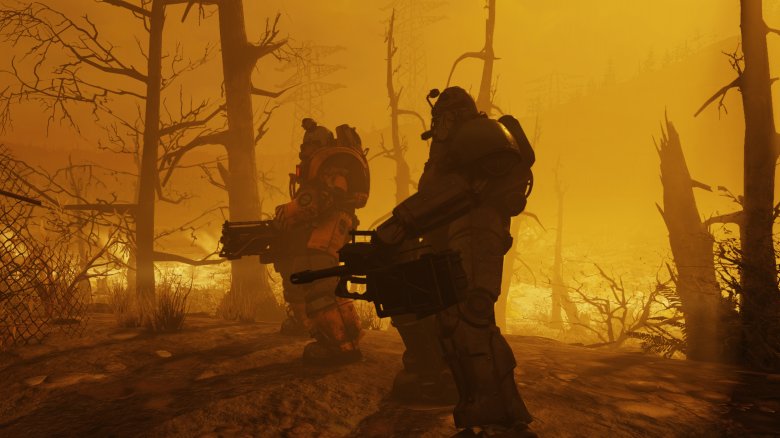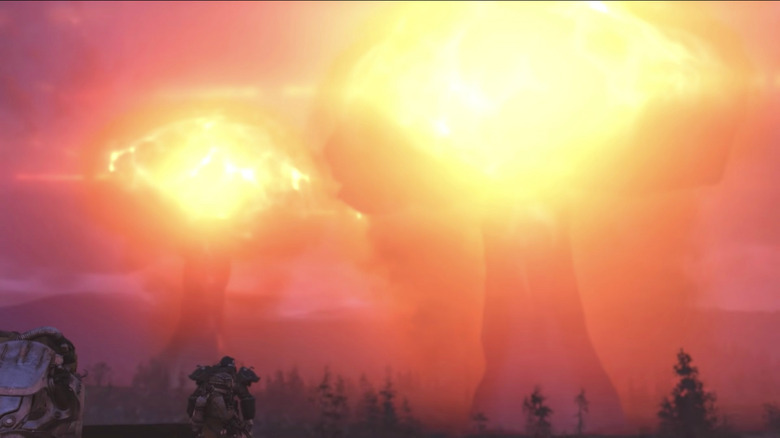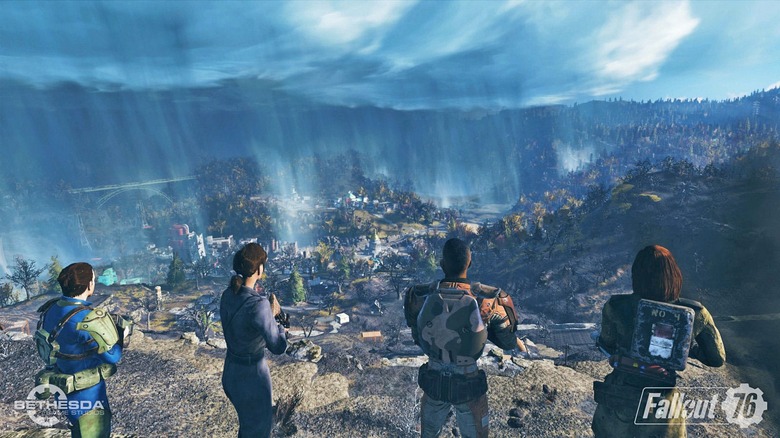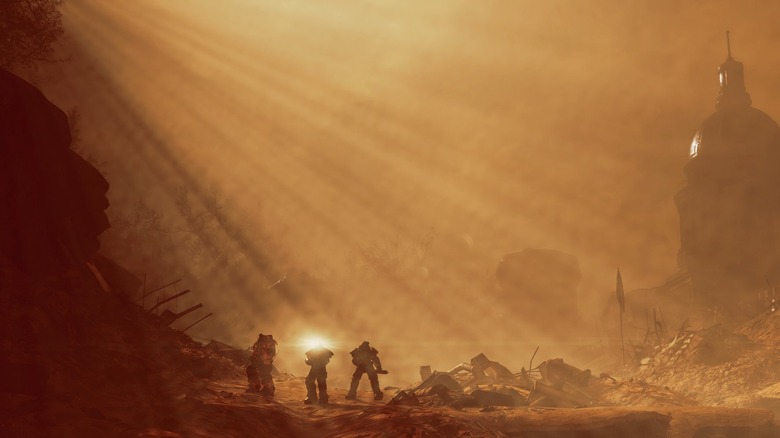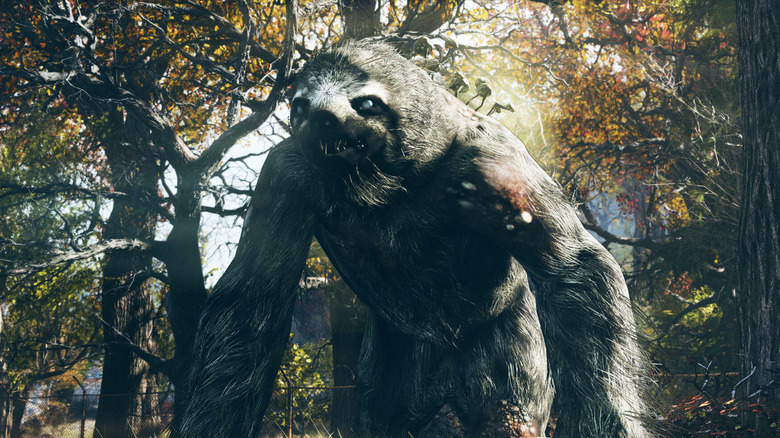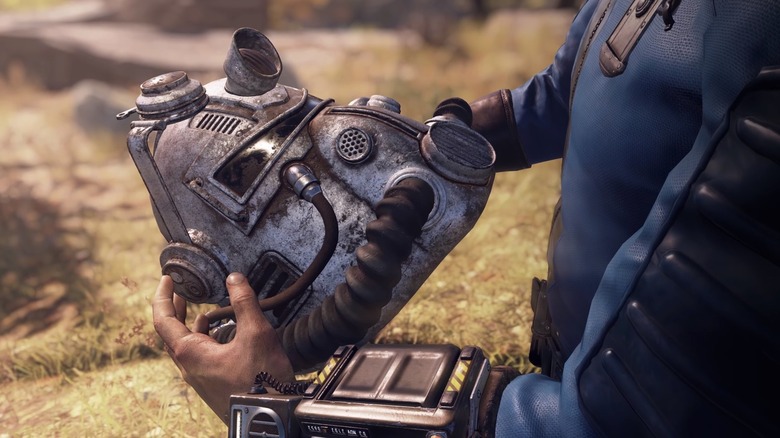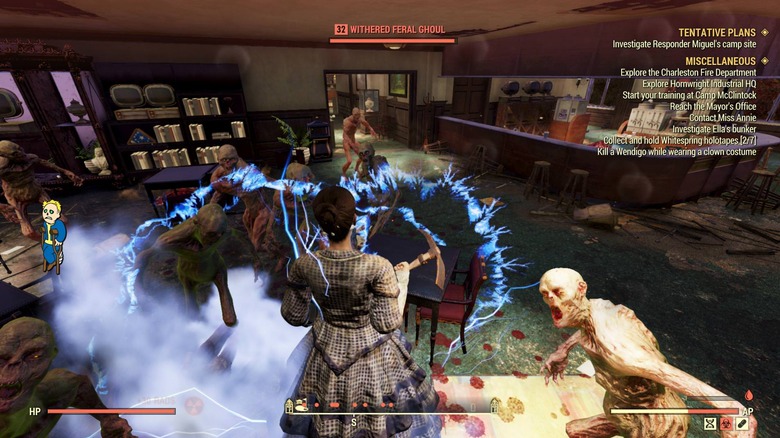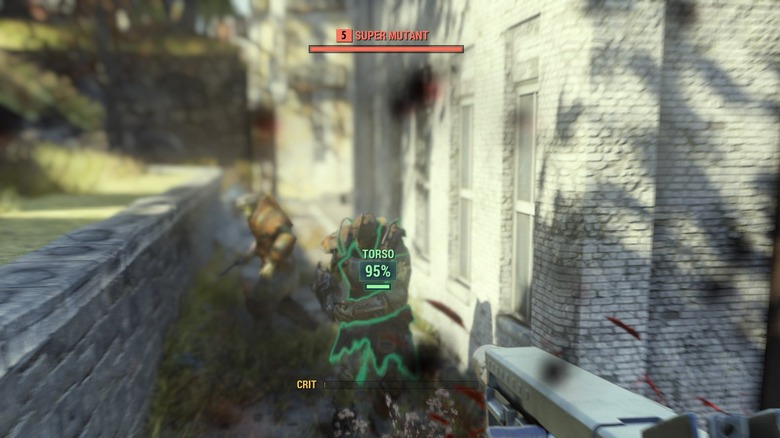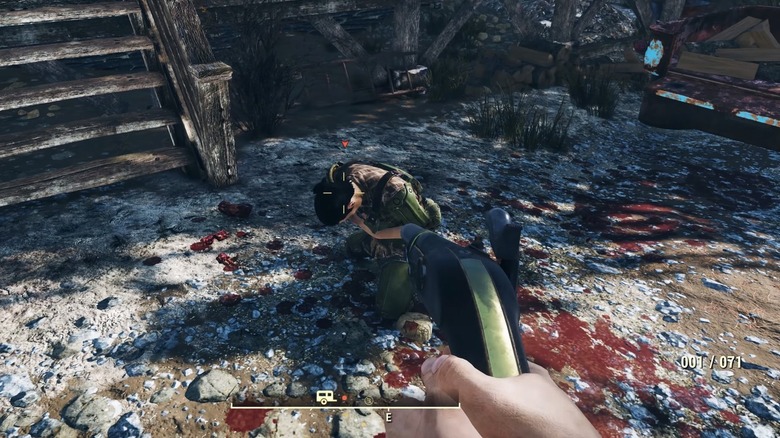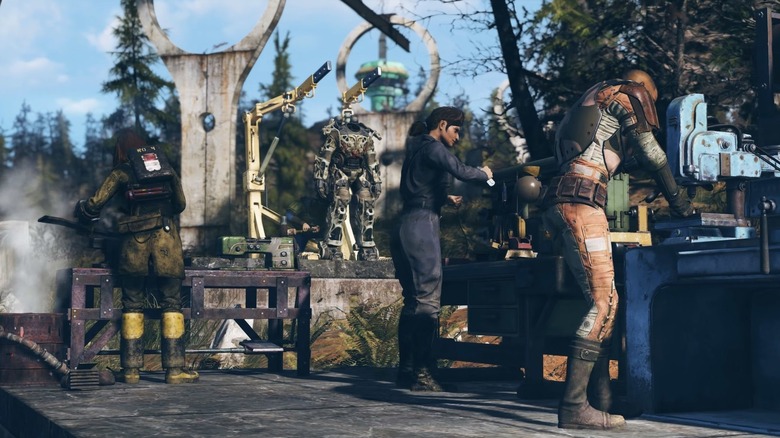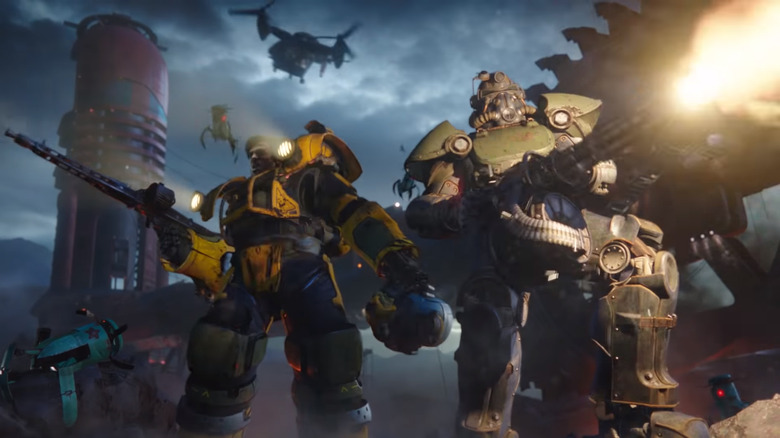The Real Reason Fallout 76 Bombed
Fallout 76 was always going to need to work hard to win back some of the franchise's core fans. A lot of people were turned off by the idea that Bethesda was morphing the beloved single-player Fallout experience into an always-online multiplayer adventure, but a strong first week would have done a lot to entice players back into the wasteland once more.
Despite the initial hesitancy from critics, it was still shocking to see just how poorly Fallout 76's launch went. So what exactly happened to one of the most ambitious series restructures in Bethesda history? We've gathered the many causes for the downfall of the game to discover how a perfect storm of questionable decisions led to the critical bombing that was Fallout 76.
Apocalyptic server issues
Release week of an online game can be a brutal affair for even the most battle-tested developers; even Blizzard struggles with World of Warcraft's servers when a new expansion comes out, and that game has been around for over a decade. Unfortunately for Bethesda, the developer clearly underestimated the stress its own servers were going to be under during Fallout 76's launch. Fallout 76 was immediately plagued with disconnect issues, with new players getting randomly booted from the online server during gameplay with no discernible quick fixes in sight. Bethesda did eventually patch this issue, but it made a poor first impression for people who were already leery about the direction Fallout was heading.
That wasn't all for Fallout 76's release week troubles. Bethesda also had to yank the servers down for around three hours later in the week, doing so without any warning and causing even more backlash from fans who had no idea what was going on. Then, players messed around with the game's nuke system, launching several at once and then completely crashing the game's servers as a result.
Bethesda looked completely unprepared for these issues, patching them out or disrupting gameplay over a long period of time. The result is a game that now appears to be rushed, and a developer that isn't ready to provide a consistent online service.
There were so many patches that players couldn't download anymore
Back in the day, downloading entire games digitally would be impossible: the internet was too slow, and people needed to actually use the phone to interact with other human beings. Somehow, though, Fallout 76's launch was so bad it returned us to those long-forgotten days of limited internet connections and hard drive space issues. Bethesda genuinely released a game that caused its players to run out of internet in 2018. Players with capped monthly internet usage reported that they couldn't play the game at launch because of how many updates Bethesda released for Fallout 76 within its first week of existence.
Between Fallout 76's B.E.T.A. download — which players couldn't uninstall unless they bought the game, by the way, as a nice little touch from Bethesda — and the multiple patches released in its first week, Fallout 76 took about 150GB to download within its first month of existence. For people with hard limits on how much download bandwidth they have access to, the result was that the patches locked them out of accessing the game they had paid for until their next monthly billing cycle.
Obviously, part of that issue stems from the players who have these restrictions and not Bethesda. But even with games like Red Dead Redemption 2, which clocked in at close to the same numbers for install, the later patches were miniscule by comparison. Bethesda routinely releasing 50GB patches was an easy way to lose early interest in Fallout 76.
It's empty
Unfortunately, Fallout 76 doesn't continue the series' long-standing tradition of environmental excellence. The wasteland that players explore in Fallout 76 is shockingly empty; there is genuinely very little to do or see.
The wilds of West Virginia aren't what anyone would expect from a multiplayer title. First of all, there are hardly any other players around at any given time. Most of Fallout 76's content ends up seeing the player exploring by themselves, which is certainly fine in theory, since previous Fallout games did fine with just one player roaming through the rubble.
The issue, however, is that Fallout 76 has been clearly designed with multiplayer in mind, meaning that there isn't a lot of content that feels like it matters for just one player. There's a lot of traveling from point A to point B and killing things along the way, but there's not really any motivation to do so other than survival. Where that void could be filled with player interaction, there typically is none.
Limiting servers to an incredibly small amount of people per expansive map was a novel idea; Bethesda didn't want the wasteland to just end up one giant party zone. Yet in doing so, the developer has created a world devoid of life and failed to offer up any distractions from that emptiness, resulting in a simulation of post-apocalyptic West Virginia that is probably too accurate.
Enemies are too similar and stupid
Fallout 76's enemies are dumb. It might seem silly to describe immolated zombies or giant moths as stupid, but even if you're setting the bar at an appropriate level for those imaginary creatures, they're still not meeting it. As a first-person shooter, Fallout 76 struggles with the most basic elements that make the genre interesting, like enemy variation and AI.
Too many enemies fall into one of two categories. The first is charging headlong into battle, even if that means their claws are up against an opponent's high-powered shotgun. The second is hiding behind cover and then occasionally offering up some token resistance by firing their projectiles into the air, kind of like when an animal in the wild puffs themselves up really big in an effort to scare predators away.
That's honestly it. Those are the two battles players could expect out of Fallout 76, not to mention the fact that enemy AI really struggles with the environment and game engine, too. Whether it is freezing in place, glitching into the air or the ground, or just getting stuck behind something, enemies frequently fall well-short of the standards that make modern FPS action acceptable.
Fallout 76's story is boring
The studio name Bethesda is inextricably tied to great storytelling. Bethesda is renowned for producing titles that challenge our understanding of how to tell a narrative, whether it be The Elder Scrolls 5: Skyrim's sprawling fantasy epic or Fallout 4's sci-fi mind-bender. It's kind of the developer's thing at this point.
That's why Fallout 76's boring narrative is pretty well inexcusable, and the game was rightly criticized at launch for featuring next to no reason to explore its world. The problem is that the multiplayer setting forced Bethesda to create a world that can't vary too much based on one player's decisions the same way a single-player experience could. Rather than having the weight of the world on their shoulders, players in Fallout 76 feel more like they're an errand runner for a world that is largely autonomous.
The inability to affect the outcome of West Virginia's fate takes away the player agency typically present in Fallout games. The result is a narrative that is almost entirely based around the past decisions made by people the player will never meet because they died years ago. All that's left is some robots and a few stragglers who point players in the direction of holotapes and records that show them what happened during the events of the Great War, which happened 25 years before the player character ever set foot in the West Virginia wasteland. It's weird, and Fallout 76 feels like it is completely disconnected from the events that it keeps trying to get players interested in in the first place.
The lack of a save feature breaks the Fallout experience
Glitches in Fallout have been acceptable in the past because of the game's single-player nature; if you screw up, your most recent save will, well, save you. Glitches are quite another thing for an online game with no save system to speak of. Where once gamers could at least rely on a trigger-happy autosave system to salvage even the worst bugs in a Bethesda game, Fallout 76 no longer has that failsafe.
While Fallout 76 isn't a traditional single-player experience, the sad reality of the online medium is that there will be time lost, and frequently. Players who experience quest-breaking bugs need to log out and log back in, which typically resets the progress they had made.
Maybe that doesn't seem like the biggest deal if it happens once or twice during an entire playthrough of a game, but Fallout 76's launch was pretty glitchy. The lost time adds up, and Fallout 76 began to appear like a bigger time sink than fans had initially thought it would be — and in a way that was far more frustrating than the typical Bethesda "one more quest" mentality. Saving has always been something we take for granted in open-world gaming experiences like traditional Fallout titles, and the loss of that feature is a surprisingly big factor in why Fallout 76's launch was so dismal.
The VATS system doesn't work in a multiplayer setting
VATS is so popular in Fallout games because it offers up the chance to enact some cool strategies on otherwise chaotic combat situations. In the past, players could pause time with VATS and spend a set amount of action points to dictate how their attacks would hit, targeting specific limbs for maximum efficiency. After unpausing, players could then watch their plan unfold in glorious slow motion, eviscerating enemies in satisfying, post-apocalyptic brutality.
Fallout 76 is a game that is online all the time and thus completely impossible to pause. That's fine, of course; it's something that Bethesda simply had to grapple with if it wanted to integrate VATS into the game. Instead, all that's left of VATS is just a weird auto-targeting system that is often more useful at spotting enemies than actually hitting them, and a combat system in general that is mostly point gun, spray bullets, reload, repeat for the entirety of the game.
It would be one thing to remove VATS altogether, but it's quite another to implement it as a shell of itself and still treat it like a selling point. There's just precious little strategy to be had in the way players can approach their weapon loadout and combat, and fans weren't happy with the way a truly beloved combat system was gutted to make Fallout 76 an easier transition into multiplayer.
The PvP system is shockingly irrelevant
Fallout 76 was marketed as a multiplayer title for a reason, though: that big departure for the series is supposed to be a major selling point. Inexplicably, Bethesda ended up making an irrelevant PvP system, turning a big factor in multiplayer into an almost nonexistent element. Players have to initiate PvP in a very clunky manner, firing back and forth on each other to ensure it's intended by both parties. Then, the winner of the PvP skirmish is granted some caps, while the loser respawns safely nearby having lost nothing except time and perhaps a little dignity. It's so low stakes that it wouldn't work in a game with thousands of people on a map at the same time, let alone the much smaller number of people in each server's iteration of Fallout 76.
PvP events are also truncated, passionless affairs that do little to entice players into participating in them. The result is that players don't seem to care about PvP in Fallout 76, which is a bad place to be for a game that did away with a lot of fan favorites in order to push online onto its players. Bethesda scheduled updates for this PvP system for later in the game's life cycle, but launching it without more depth in that area is a big reason why Fallout 76 failed to gain any traction on its release.
The base-building concept wasn't a good build-around
Fallout 4's base-building system was one of the most plodding, tedious elements in a game that was otherwise pretty optimized for streamlined play if fans wanted to do so. Sure, base-building had its fans — all ten of them — but it was a divisive element and it was rarely the reason people remained playing Fallout 4 after the initial dazzle of its massive world wore off.
So what did Bethesda do? More base-building. Fallout 76 strips many of the other characteristics that people enjoyed about Fallout 4, like a plot or character, and then adds some extra base-building on top of it. That resulted in a greater separation from the core Fallout gameplay elements that fans have come to expect, meaning that Fallout 76's base system needed to be stellar to win people over.
Spoiler alert: it wasn't. The stash limit was horrific at launch, forcing players into micro-managing their base in a way that was the antithesis of fun. The build budget in the game mitigates player ability to create cool looking bases, too, meaning that for all of the supposed freedom that comes with creating a home away from home in Fallout 76, the end result is a pretty glaring lack of diversity.
Fallout 76 tries to do too many genres at once
We're used to seeing extremely ambitious projects from Bethesda so often that it didn't even register the developer might aimed a little too high with such a drastically different direction for Fallout. There's some major thematic disconnect in Fallout 76 that makes it feel like it doesn't know what it wants to be.
Many of the game's quests are easy to complete without others, but lack the narrative depth that would make the solo experience fun. The multiplayer feels superficial, with the aforementioned PvP being pretty irrelevant and group quests being frustrating experiences thanks to server disconnects, a bad combat system, and more. The endgame is likewise a weird juxtaposition of the game's mechanics: go out and loot treasure from high level enemies until you have no room in your bags, go back, store it in the base that doesn't really do much anymore except hold items, then rinse and repeat until you can craft something from the loot you acquired.
There are survival elements, too, but they're pretty basic and the game has a free fast-travel system that eliminates them from ever being relevant. There isn't even a major hub for players to gather and interact with each other!
Sometimes that ambition is exactly why a game like Fallout 76 falls apart at the seams and has the kind of nightmare launch week it had.

